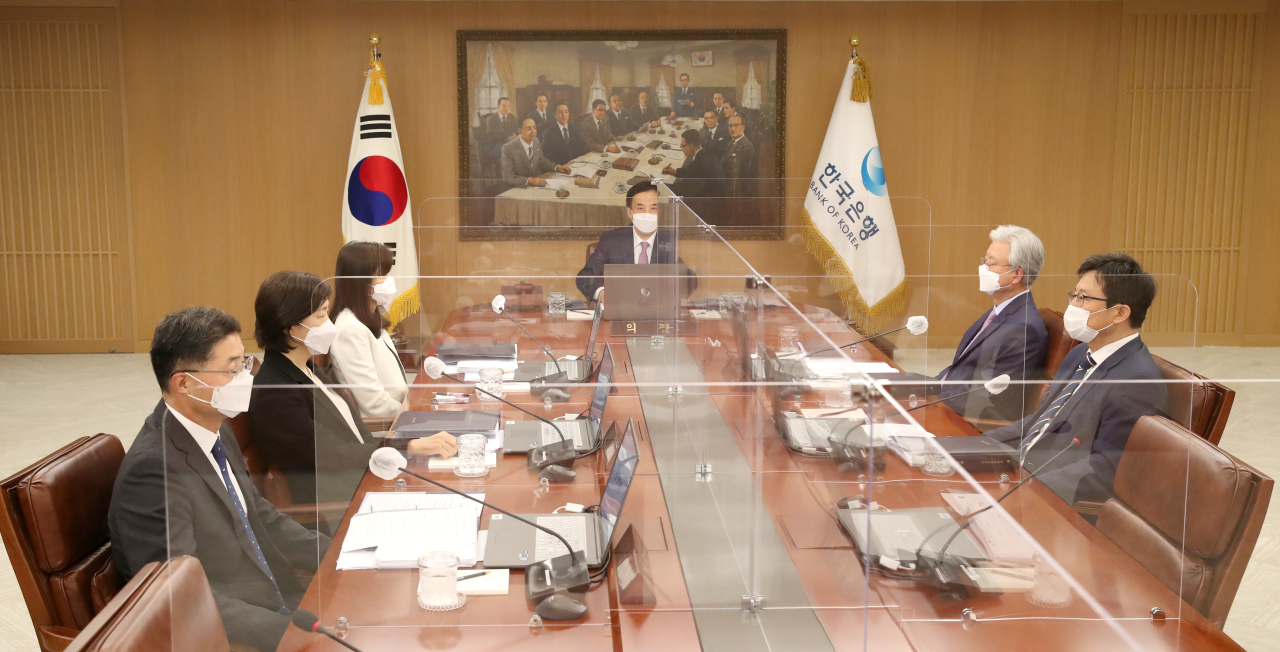 |
Bank of Korea Gov. Lee Ju-yeol (center) presides over a Monetary Policy Committee meeting in Seoul on Aug. 26, 2021, to decide the key rate for this month. (Yonhap) |
Businesses and individual borrowers in South Korea voiced criticism on Thursday over the central bank’s decision to raise its key interest rate for the first time in 15 months, due to a possible increase in their debt burdens.
In an effort to counter growing inflationary pressure and household debt, the Bank of Korea hiked its key rate by 0.25 percentage point to 0.75 percent.
The move is likely to exacerbate debt-servicing burdens, particularly for the self-employed and small businesses, who are already suffering from a liquidity crunch. The BOK has been signaling its intention to increase the rate for months, but its announcement Thursday appears to be carried out sooner than the market expected.
“The central bank increased the benchmark interest rate while South Korea’s domestic economy has yet to stage a modest recovery due to the COVID-19 resurgence. The measure will add to economic difficulties faced by small merchants most affected by the pandemic,” said Cha Nam-soo, a researcher at the Korea Federation of Micro Enterprise, an association of self-employed people here.
The credit loan balance taken out by the self-employed rose 10.8 percent on-year to 409.7 trillion won ($373 billion) in July. When the central bank raises the key interest rate by 1 percentage point, the interest repayment burden on them is estimated to increase by 5.2 trillion won, industry data showed.
Concerns have also been raised by small and medium-sized enterprises about the possibility of liquidity crisis triggered by higher interest rates at commercial banks.
“As sales have not recovered from the pandemic, debt-servicing burdens of small and medium-sized companies will sharply increase, which may cause a vicious circle of late loan repayments by firms due to the lack of liquidity and banks becoming insolvent largely led by bad loans,” the Korea Federation of SMEs said in a statement.
Meanwhile, the first pandemic-era rate hike immediately sent jitters to the local stock market as investor sentiment weakened. The benchmark Korea Composite Stock Price Index, which rose 5.97 points, or 0.19 percent, to trade at 3,152.78 points in the first 20 minutes of trading, fell 18.28 points, or 0.58 percent, to close at 3,128.53 points.
As for the overheated real estate market, market watchers say people looking for mortgages are likely to stay on the sidelines for the time being, market watchers said.
The latest rate hike by 0.25 percentage point is projected to have limited impact on local financial markets,” said Park Hap-soo, an analyst at KB Kookmin Bank.
However, Park added that homebuyers are likely hesitate to invest in real estate as it is possible the BOK could implement another rate hike by the end of this year and as financial authorities tighten lending rules.
The policymaking Financial Supervisory Service recently called on local banks to tighten their screening for unsecured loans as part of efforts to cope with rising household debt.
All commercial lenders were required to submit their plans to adjust caps on credit loans extended to individual borrowers by Friday. Banks have thus come up with or are mapping out plans to cut back on caps on unsecured loans, according to the sources.
By Choi Jae-hee (
cjh@heraldcorp.com)







![[Today’s K-pop] Blackpink’s Jennie, Lisa invited to Coachella as solo acts](http://res.heraldm.com/phpwas/restmb_idxmake.php?idx=644&simg=/content/image/2024/11/21/20241121050099_0.jpg)
